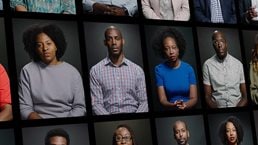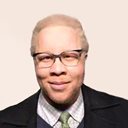When George Floyd was murdered on May 25, conversations about race were everywhere—from news headlines to social media. Yet it felt some of the most important voices within the Black community were not being heard. I felt compelled and a sense of responsibility to contribute to the discourse in a meaningful way, not only as a filmmaker but also as a Black man living in America.
I sought to do this through Our Black Voices, a video collection featuring perspectives from more than 50 Black colleagues at McKinsey across America. It was a personal opportunity to tap into—and amplify—the reservoir of knowledge, experience, insight, and awareness that is abundant in the Black community, which so often remains unheard.
As I sat down to decide the best approach for this project, I reflected on what’s always been a driving force in my filmmaking: discovery. When you’re making a documentary film, there’s no clear narrative when you start, but there is a clear sense of purpose. A great part of the joy of the process is learning, pivoting when you discover something new, and meeting people where they are.
With Our Black Voices, that meant sometimes, colleagues were ready and very willing to share their stories with me. Sometimes, they weren’t. It’s not hard to imagine how painful it can be for Black people to speak about their experiences, and I didn’t take lightly the responsibility of creating a space for people to share their truth and vulnerability.
The colleagues who agreed to let me interview them took a risk: As a Black man, I’m familiar with being hesitant to speak out. First, there’s the fear of sounding like you’re complaining. Then there’s also an emotional vulnerability required in putting yourself out there. Moreover, no one wants to go first. So I worked hard to gain my colleagues’ trust because I understood where they were coming from. But I also knew we were creating something special—and we were going to do it together.
Because of the pandemic and social-distance restrictions, I assembled a small crew, and together we drove 14 hours from New York to Atlanta and captured more than 20 colleagues in four days. A few days after that, we drove to D.C. from New York in the morning, filmed all day, then packed up and drove to Philadelphia that same night. Before and after each filming, the crew and I got tested.
During the interviews, I wore a mask but my colleagues took theirs off when speaking on camera. We social distanced, but we talked about really sensitive things, like the trauma of being Black in everyday life. They spoke about experiences that I could relate to on a very personal level: Most, if not all, recalled childhood moments when they first realized what their race meant and how it would shape their lives. Our stories pulled on common threads.
When I think of my experience creating Our Black Voices so far, I’m reminded of how complex Black culture is in the United States—and beyond. Through conversations with my colleagues Sara Prince, Tiffany Burns, Monne Williams, and others, I’m reminded of the complexities of being a Black woman in America. And as the son of a mother from Nigeria, I have a renewed and deeper appreciation for the experiences of Black immigrants.
The irony and tragedy of the events that unfolded to bring us together is not lost on me. I recently read a quote from the writer, feminist, and civil rights activist, Audre Lorde: “Without community, there is no liberation.” I’m thankful for the liberating moments I experienced during this process. In a typical documentary, only 10 percent of the content makes it into the final cut. You can only imagine the journeys we went on together in the remaining 90 percent. I’m very thankful to Dame Vivian Hunt, who enthusiastically gave me the green light to proceed three minutes after I first sent the idea to her and other firm leaders. And to senior web developer Petra Vincent, who created a distinct digital experience internally with a more comprehensive set of the videos for all McKinsey colleagues to view.
I hope Our Black Voices provides viewers with an opportunity to hear from, engage with, and consider Black perspectives. And I hope it inspires understanding as an impetus for change. I suspect many people will be taken aback by what they hear in these interviews, whether it’s straightforward honesty or the fearless vulnerability. By better understanding the experiences of our colleagues, I’m hopeful perspectives, perceptions, and biases change so that you’re inspired to listen more deeply to the Black voices that surround you.
These three videos are just the beginning of an ongoing project. I’ll continue working to capture our Black colleague voices across our global firm in hopes of building the largest collection of Black professional voices to ever exist. As a filmmaker I remain hopeful and energetic to see where this story goes.

